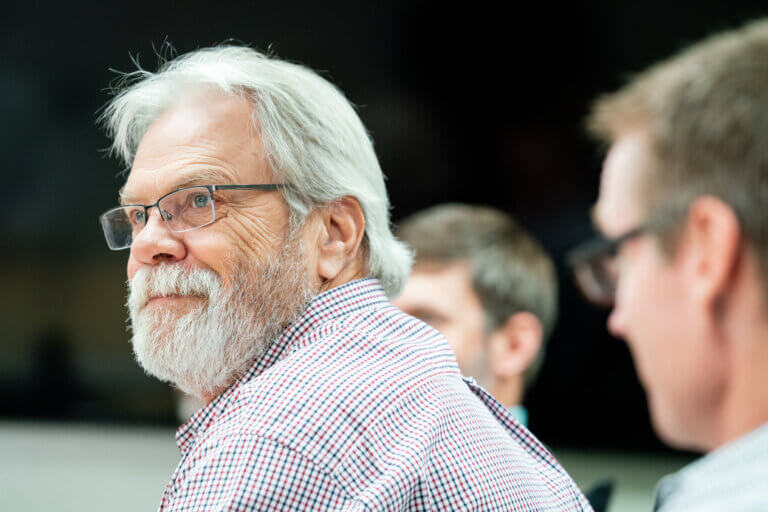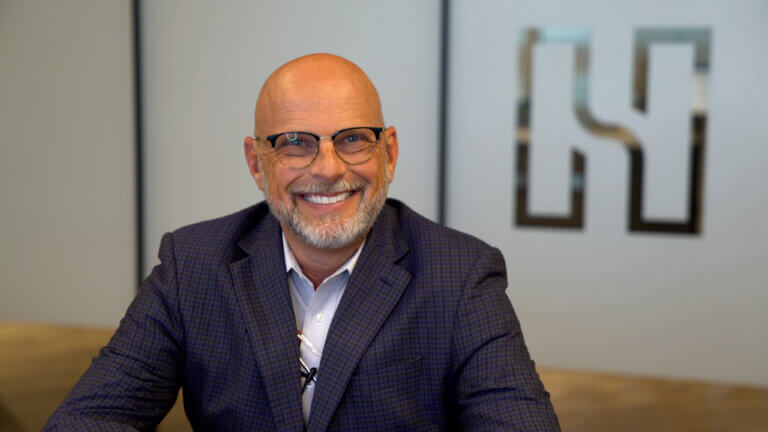
Our core values are more to us than buzzwords on an “About Us” page. They’re principles we live by every day through the work we do. The Golden Rule is a core value we truly believe you have to approach every interaction with to be successful. It’s clearly how we want to build for our clients — we treat our clients and the projects the same way we would want someone to treat us. We aim to be good stewards of their time, budget, and resources and we’re honest at every phase of the project — even if that means having an uncomfortable conversation. But, how does the Golden Rule look in our day-to-day lives in the field or in our offices? We sat down with two members of our Preconstruction team in Tennessee, who have a great story about how treating each other as we would want to be treated can have a domino effect of strong mentorship and supporting growth in our industry.
Cindy Anderson is the Director of Preconstruction for our Tennessee Division. She has been with Hoar for 31 years.
Heather Dozier is an Assistant Preconstruction Manager who has been with Hoar for seven years, five of those in Preconstruction.
Five years ago, Heather made the transition from a job clerk to working with our preconstruction team. She was able to make that leap, in part, because of mentorship from Cindy and team members in the Nashville office.
How did you both join the construction industry?
Heather: I didn’t go right into preconstruction, I first worked as a job clerk. My degree is in interior design, but I graduated during the recession, so there weren’t a lot of jobs available. Right after graduation, I worked as a bookkeeper before working for Hoar Construction.
Cindy: Going as far back as high school, I had an aptitude for math and solving problems. I was attracted to architecture when I started college but found that the curriculum was not really aligning with my interests. That’s when I realized Building Science was more aligned with my skill set and strengths.
Heather, how did you make the transition into Preconstruction?
Heather: I told one of our project executives that I was interested in construction and could read plans, and he mentioned me to Cindy. Cindy approached me and asked if I would be interested in learning how to do Takeoff for a project, and I said I would love that. I found the detailed nature of the work really interesting, and I enjoyed my role in the process. I did return to the field as a job clerk after that, but asked if there was an opening for me to move to Preconstruction permanently. Luckily, there was!
Cindy: Certainly, when you’ve got somebody within our company that has some familiarity, even though it’s not direct experience, and an interest in growing into a new role — I feel like that’s a huge opportunity to be able to grow our talent within. That was the case with Heather.
Cindy, what about Heather made you think she was a good candidate for a preconstruction role?
Cindy: First, Heather and I went to lunch a few times because I didn’t want to mislead her with any expectations of what we do and the pace that we keep. But even from the beginning, when she came in and was doing the Takeoff, it was very apparent to me that she had the skill and the right mindset for preconstruction. I think you’ll hear a lot from people who are in preconstruction — we are extremely focused on the details. We’re very thorough in our review of the documents.
Also, the one thing I was most appreciative of is she wanted to learn. Heather’s a very curious person. She wants to learn more, and she is a very quick learner. She definitely brought a needed skill set to the table at the right time.
Heather, did you have an exposure to or interest in preconstruction before joining Hoar Construction?
Heather: Preconstruction is one of those roles that if you don’t work in the industry, why would you know it exists? So, I wasn’t aware it was a career I could pursue before I joined Hoar as a job clerk. I had the opportunity to observe our preconstruction team and realized the work involves a lot of the things I’m interested in — plans, architecture, budgeting, bookkeeping, and diving into the details. It just seemed like a good alignment of a lot of the things that I enjoy doing.
Cindy, did anyone ever kind of extend an opportunity to you in your career like you did with Heather?
Cindy: I think David Freeman, who hired me but has since retired, was what I would call a servant leader. I take a lot from his leadership style. He definitely was a mentor and he really believed in me. I had lengthy conversations with him about what my future would look like taking one path versus the other. And in a male-dominated industry to have a male mentor like that, it was certainly very impactful to know that he always had my back.
Heather, how has your experience guided how you approach mentoring others?
Heather: When we have preconstruction interns or hire a new preconstruction engineer, I try to help them out as much as I can. I try to mentor them and guide them in moments where I would have appreciated having someone step in and say, “Hey you know, that’s one way to do it, but this may be an easier way.” I do try to keep in mind what it was like starting out in preconstruction so I can encourage newer people.
Cindy: Heather does a great job when we have interns or new team members serving as a mentor to them. We try to be very inclusive of all team members, regardless of their role on the team. We want to have those newer team members participating in ownership discussion meetings and design meetings. I feel it’s important for everyone on the team to hear firsthand at the table what the owners’ expectations are.
Have you noticed any changes with the representation of women in construction?
Cindy: Here in Tennessee, we have a 50/50 split in Precon, with three women and three men in our department. I’ve seen improvement and seen an increase in the visibility of females in construction. Mentorship and professional support and development are so important because, as a group, we are still a minority in a male-dominated field. I’d like to think that we’re welcoming and encouraging of each other here and supportive because we want to see everybody grow and succeed.

